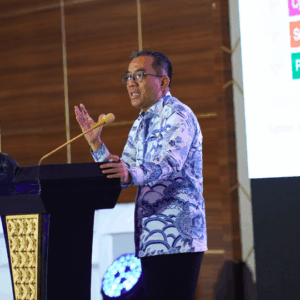Transformative measures are crucial to achieving net zero emissions by 2050, as climate change driven by rising global temperatures demands urgent attention. Modern businesses can no longer prioritize profit alone.
“We must also address environmental, economic, and human aspects,” said Suripno, Vice President of Sustainability Strategy at PT Pertamina (Persero), during a discussion titled “Lighting the Way for a Sustainable Energy Future in Indonesia,” held by SBM ITB, on Thursday (12/12).
Businesses that consider these three pillars adopt a sustainable perspective. According to Suripno, three key elements are essential for the energy transition: security, equality, and sustainability. He underscored the importance of transparency and commitment to sustainability in the modern era.
“Investors now look at financial reports and the company’s sustainability report before making a decision,” he said.
Suripno explained that Pertamina has adopted an integrated strategy with its subsidiaries, which is the cornerstone of its approach to addressing energy transition challenges. Pertamina’s sustainability strategy is guided by the PDCA (Plan, Do, Check, Act) principle, ensuring a continuous, sustainable process across all business operations.
Pertamina has implemented several strategic initiatives to support global efforts for a better environment, focusing on reducing Scopes 1 and 2 emissions, cutting methane emissions, eliminating zero routine flaring, and increasing the green revenue mix. Over the next five years, Pertamina plans to advance low-carbon energy development, expand carbon trading initiatives, enhance gas-to-power capacity, invest in renewable energy, and produce batteries. For carbon trading, Pertamina is developing nature-based solutions and carbon credit trading.
Suripno highlighted that sustainability is at the core of every Pertamina business activity. This approach positions Pertamina as a leader in Indonesia’s energy transition, ensuring competitiveness in the global market through a sustainability-focused strategy.
“If Pertamina does not integrate sustainability into every activity, we risk losing future market share,” he said.
Despite these efforts, Suripno acknowledged that the low-carbon business in Indonesia faces challenges due to a lack of integration. While Pertamina has initiated steps such as carbon credit trading and nature-based solutions (NBS), these initiatives are still in their developmental stages.
In contrast, neighboring countries have more established regulations, integrated carbon trading ecosystems, and supportive international networks. Suripno stressed that Indonesia must enhance its capabilities through collaboration, technological advancements in low-carbon solutions, and strategic alignment.
Pertamina has made an ambitious commitment to achieving net zero emissions, guided by a dual growth strategy focused on low-carbon energy and carbon business. Integrating climate-related risks and opportunities into the company’s strategy further strengthens its global competitiveness.
With these initiatives, Pertamina is optimistic about contributing to global sustainability targets while reinforcing Indonesia’s role in the sustainable energy transition.






